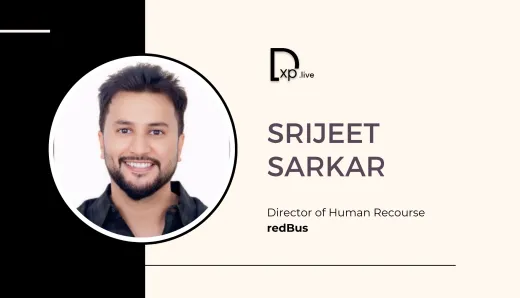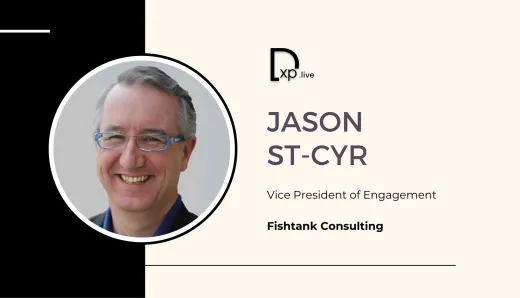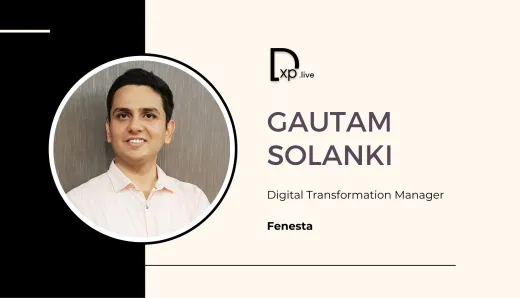Marine Gandy on Drupal's Inclusive Community Growth
Marine Gandy’s Vision for a Welcoming, Accessible Drupal Ecosystem
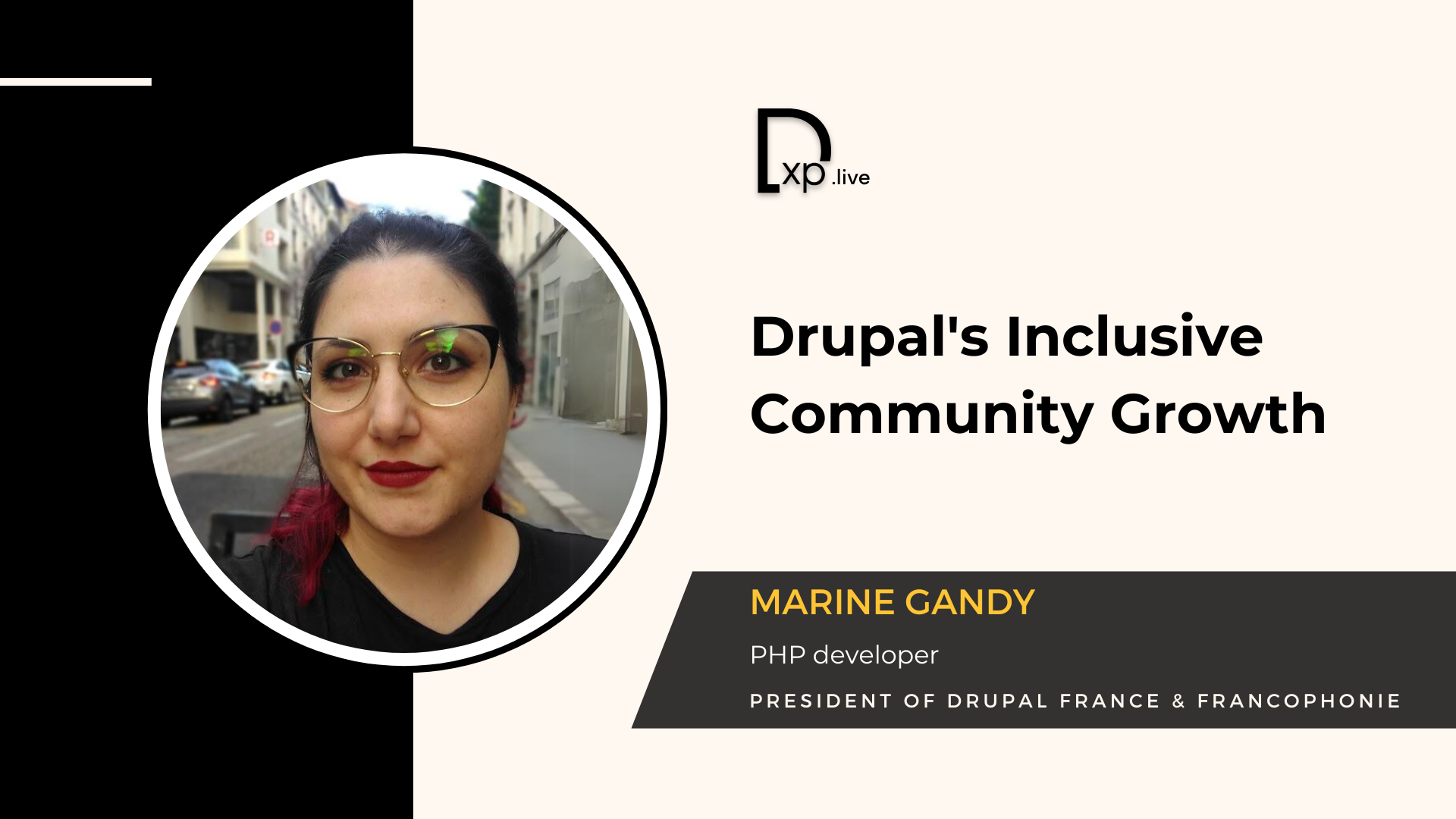
Marine Gandy is a dedicated PHP developer and prominent figure in the Drupal community, currently serving as President of Drupal France & Francophonie. Marine’s journey in Drupal spans over eight years and her leadership has been integral to fostering the French-speaking Drupal community, especially through initiatives like the online French-speaking Drupal 11 release party and Drupalcamp events in Rennes. She has also been a key speaker at prominent events such as DrupalCon Lille, DrupalCon Prague, and Drupal Mountain Camp in Switzerland, sharing insights and championing the values of inclusivity and accessibility within the Drupal ecosystem.
In 2023, Marine was honored with the prestigious Women in Drupal Award in the "Build" category, recognizing her as a builder and community advocate who has contributed significantly to Drupal's growth and vibrancy. Marine is passionate about community building and making Drupal accessible to both technical and non-technical users, as demonstrated by her support for the Starshot Initiative. She continues to drive Drupal’s future through her leadership and dedication, inspiring the next generation of developers, site builders, and open-source advocates.
INTRODUCTION
In this insightful interview, we sit down with Marine Gandy, a passionate advocate and leader in the Drupal community, to explore her unique journey from an English major to a key figure driving Drupal’s growth and inclusivity. Known for her dedication to community building, Marine embodies Drupal’s motto, “Come for the code, stay for the community.” Her work goes beyond code, focusing on fostering a welcoming environment for diverse voices within the French-speaking Drupal ecosystem and beyond.
From organizing events to mentoring newcomers, Marine brings an infectious energy to every aspect of her role. She discusses the challenges and triumphs of sustaining community engagement in a post-pandemic world, her vision for Drupal’s future, and the importance of creating accessible entry points for both technical and non-technical contributors. Join us as Marine shares her thoughts on the evolving Drupal landscape, the Starshot Initiative, and her aspirations for an inclusive and collaborative open-source ecosystem.
You’ve had an impressive career as a Developer Relations Engineer at Platform.sh and as President of the Drupal French Association. Can you share how your journey into Drupal development began? What advice would you give to new developers who are just starting out, especially those looking to contribute to open-source communities like Drupal?
Marine: My journey into Drupal development was somewhat accidental. Originally, I studied English language and literature, aiming to become an interpreter or teacher. Coding had always intrigued me, but in France, there’s a common belief that a scientific background is essential for development, which kept me from seeing myself in that role. After earning my English degree and deciding against teaching, I explored other paths and found a two-year program with a "sandwich training" approach, allowing me to alternate between school and work. This led me to a small Drupal agency, where I got my first real exposure to Drupal, and pure luck turned it into a career I truly love.
My transition into the Drupal community happened when a new colleague, who was very involved in the community, encouraged me to attend a Drupal Camp in Paris in 2019. It was my first Drupal event, and meeting the welcoming community felt like joining a family. By the end of the camp, some members encouraged me to join the French Association’s board, and that’s how I began my journey within the community. Initially, I joined as the board’s secretary, and over time, as I became more active, I transitioned into the role of president.
For new developers, I recommend finding what truly excites you because web development offers a vast ecosystem of languages, frameworks, and specialties. If you enjoy problem-solving, user-focused frameworks like Drupal can be very fulfilling.
Drupal is especially suitable for those who want to solve real-world problems without reinventing the wheel. Contributing to open-source doesn't always mean writing code. You can translate documentation, share helpful tips, organize meetups, or even improve the documentation when you find it unclear. Small contributions like these are highly valued and are a great way to ease into the community. Meeting others who are passionate about the same work can be incredibly motivating.
As the President of the Drupal France & Francophonie Association, what has been the most rewarding part of your leadership role? How has this position influenced the Drupal community in France?
Marine: I’m not sure how much influence I have, but what I find most rewarding is finding ways to keep the community connected and active. Like many communities, COVID really impacted us, and even now, participation hasn't fully bounced back to what it was before. Fewer people are attending DrupalCons and DrupalCamps, and meetups are challenging to organize, with fewer attendees and organizers than we once had. Many people seem to prefer spending time with family or simply watching replays online, especially if they’re already working from home.
In this context, my role as president has been both challenging and rewarding as I work to maintain that community link. Hosting DrupalCon Lille in France last year was one of the highlights. Although the main organizing team is led by professional event organizers and volunteers from the Drupal Association, I was thrilled to be involved as a local ambassador. That experience even took me to DrupalCon Prague, my first DrupalCon, where I could help drum up excitement for the event in France.
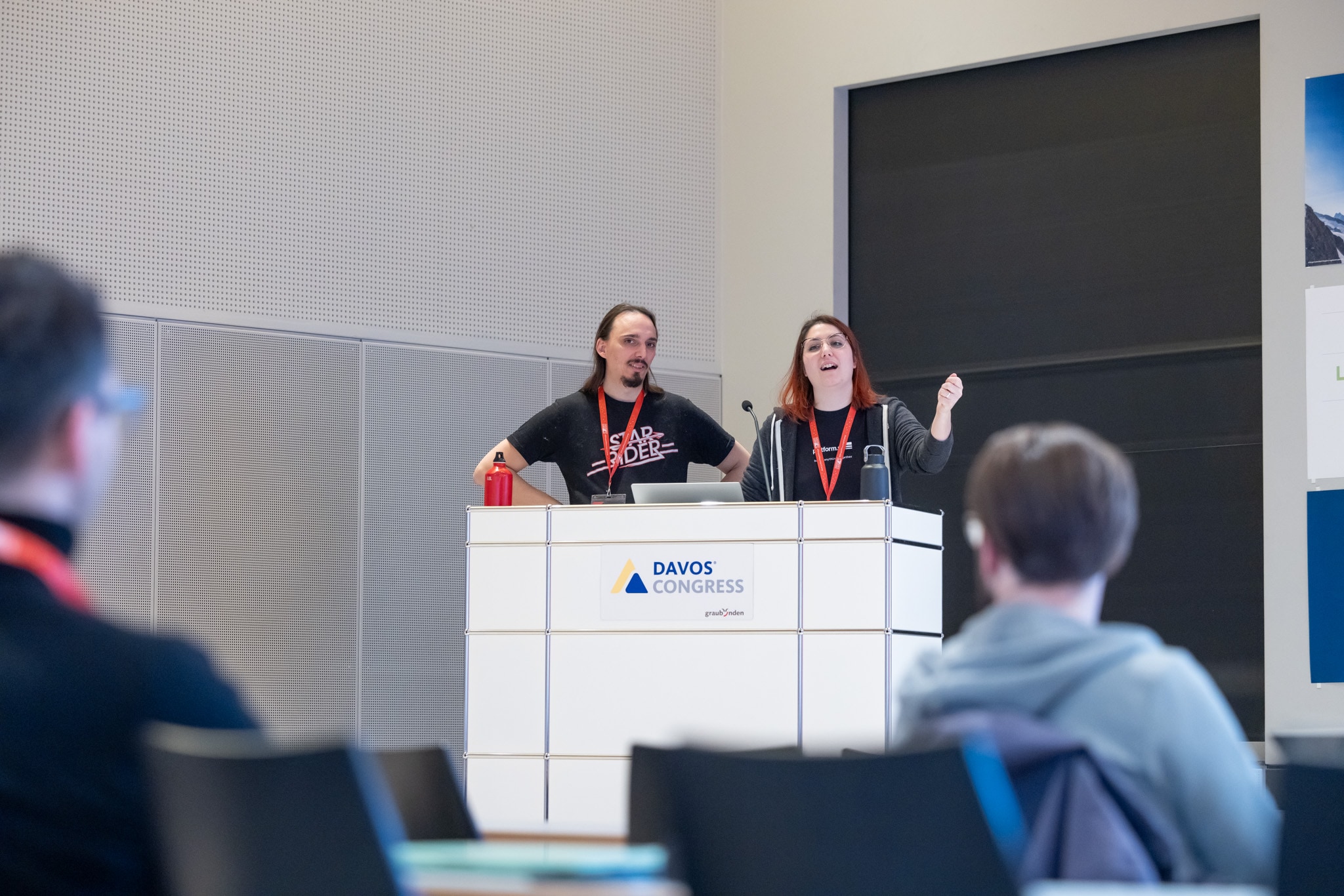
This role has opened many opportunities for me, and though it requires a lot of time and energy, I feel I get back more than I give. To re-energize the community, we organized a “Warm-Up Tour”—a series of meetups across different cities, with around 12 events in total, including some in Belgium, Switzerland, and even Dakar. It was incredible to see the enthusiasm spread across French-speaking regions.
In the end, the most gratifying part of my role has been organizing these events and seeing the community come together. It’s been a long journey since I joined the board in 2020, but finally hosting a Drupal Camp this year was truly fulfilling and a testament to our community's resilience.
You’ve played a crucial role in fostering the French-speaking Drupal community. What are some unique challenges you’ve faced in uniting this diverse group, and how have you addressed them?
Marine: One of the biggest challenges has been keeping the community active, especially after COVID-19, which affected tech communities globally. Many long-time volunteers, who have dedicated over a decade to the Drupal ecosystem, are now ready to focus on other parts of their lives, making it difficult to find new members. It’s particularly challenging to engage new developers who may use Drupal at work but aren’t necessarily aware of or interested in the broader community. This is something we discuss often with other European associations, as it’s a common issue across local communities.
Another unique challenge is maintaining a balance between accessibility for French speakers and inclusivity for non-French-speaking participants. Our association initially formed to ensure Drupal’s accessibility to French speakers, so we work hard to translate core content and modules into French. However, we’ve received some criticism that exclusively French content may feel isolating to those outside of France. To address this, we’re planning future events, like Drupal Camp, with additional English tracks. This way, French speakers can comfortably participate, while international contributors are also welcome. It’s all about ensuring accessibility for everyone, regardless of language proficiency, so that all feel genuinely included in the community.
The Drupal community highly values inclusivity and accessibility. Can you tell us about your experience with inclusivity in the French Drupal community?
Marine: Inclusivity is something we prioritize greatly in the French Drupal community. We work to ensure everyone can participate, regardless of location or schedule. We hold online events and make replays available on YouTube, which helps those in different time zones or with limited internet access. Our association supports French-speaking people beyond France, like those in Canada, Belgium, Switzerland, and various African countries, by offering content in French and creating a welcoming space for those who might not have their own local association.
We’re also committed to making everyone feel safe and respected, including underrepresented groups like women, LGBTQ+ members, and newcomers to tech. At our events, we foster an environment where anyone can ask questions without judgment.
For instance, at our recent DrupalCamp, we invested in live subtitles to accommodate attendees with hearing challenges, ensuring accessibility for all. This focus on inclusivity is fundamental to Drupal’s open-source spirit, as we believe open-source should truly be for everyone, with accommodations and support for all.
You’ve won the prestigious Women in Drupal Award 2023 for the "Build" category. How does it feel to be recognized for your contributions, and how has this recognition impacted your work or approach to community-building?
Marine: Honestly, it still feels surreal to have received the Women in Drupal Award in the "Build" category. I was genuinely shocked—I never expected such recognition and often felt like "just another member" of the community. But knowing that my contributions, like helping to prepare for DrupalCon, were seen and appreciated is incredibly validating. The award was especially meaningful because the previous and fellow recipients are such impressive women who have dedicated years to the Drupal community. Being recognized alongside them has been a huge honor and a reminder that my efforts in community-building are making a difference.

This recognition has given me even more energy to continue contributing. It’s rewarding to know that pouring your heart into something, whether in an association or at work, is appreciated. When I received the award from Surabhi, an inspiring community member, it felt like a meaningful handoff. This tradition of passing the award on to the next recipient is a special way to celebrate each other’s contributions and encourages us to keep nurturing and building the community.
What inspired you to stay in the community for so long, and are there any upcoming events where you’re part of the organizing or volunteering team?
Marine: The Drupal motto, “Come for the code, stay for the community,” perfectly captures my journey. I initially joined for the technical aspects, but it was the warmth and support of the community that truly made me stay. Over the years, I’ve built strong friendships, and being part of this community feels like being part of a family. This year, I’m continuing my involvement as a local ambassador, working with the grants, scholarships, and diversity fund. For DrupalCon Vienna, I'll likely be volunteering again, and we’re also planning local events in France, including the 2026 Splash Awards and a new Drupal Camp. Additionally, I’m serving on the jury for the Netherlands Splash Awards this October, which will be an exciting chance to recognize innovative projects.
Any final thoughts you want to convey to our audience?
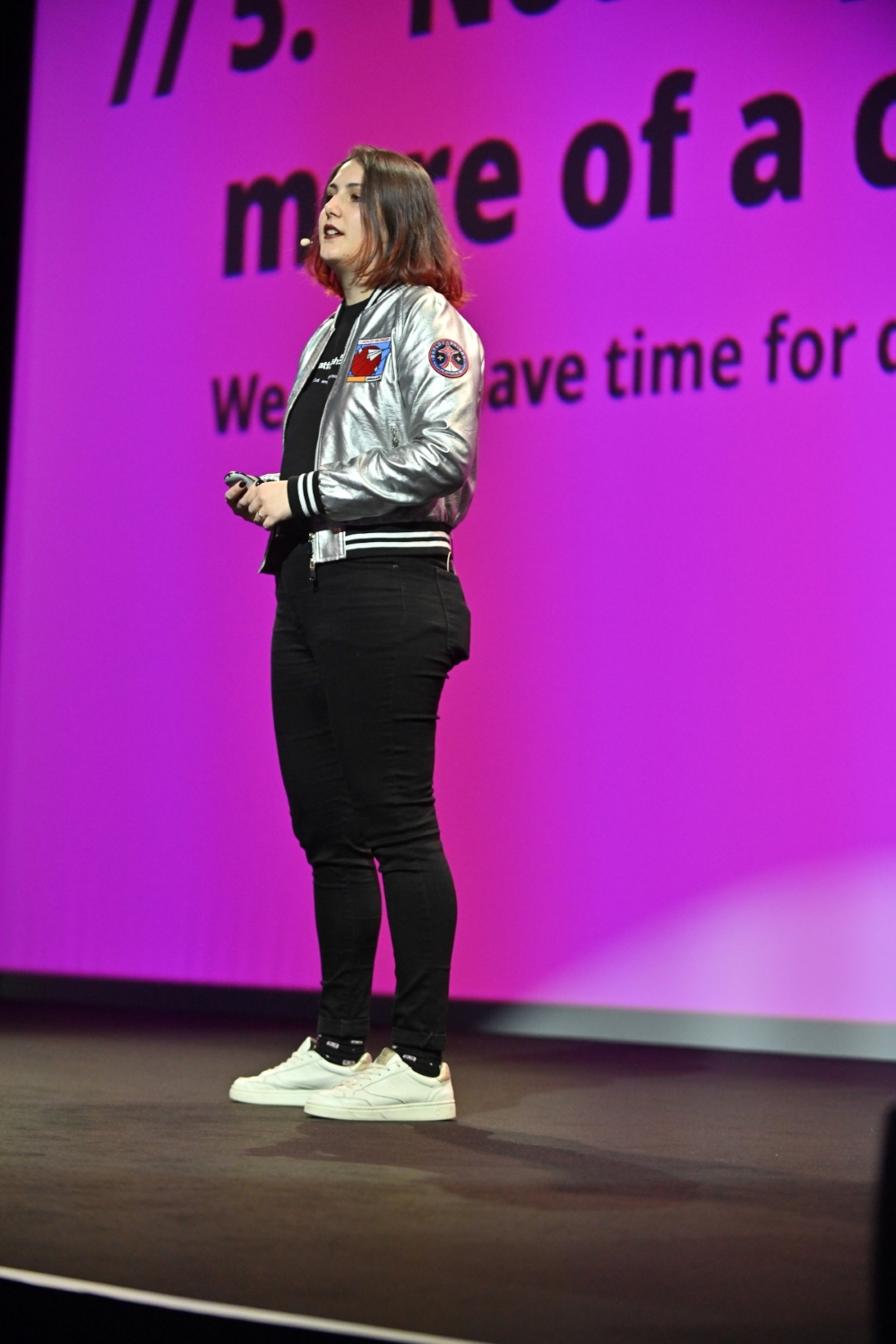
Marine: I’m especially excited about the Starshot Initiative for Drupal CMS. When Drupal moved to Symfony components in Drupal 8, we unintentionally lost some community builders who weren’t as technically inclined or comfortable with tools like Composer. Drupal has always empowered users to create a lot from the admin side, and it’s time to return to that low-code, no-code approach that made it accessible to so many. With features like auto-updates and a more user-friendly experience on the horizon, we’re building a bridge to welcome back these users. We now have advanced tools like Symfony, modern PHP, and enhanced security, and by adding easy plug-and-play options for site builders, we’re aiming for a thriving, diverse community. It’s an exciting step toward making Drupal accessible to new people, allowing them to join in and feel part of something bigger.
For more such interesting interviews, subscribe to our website.


